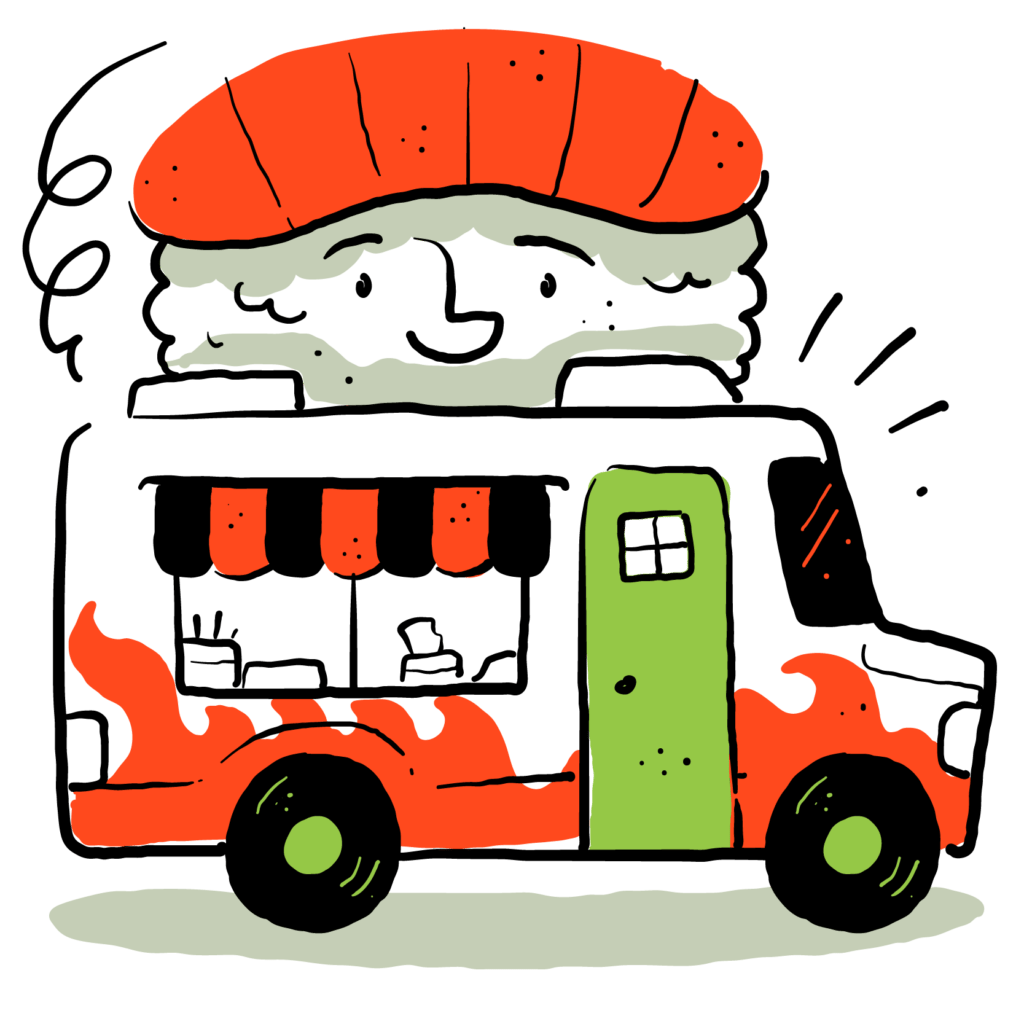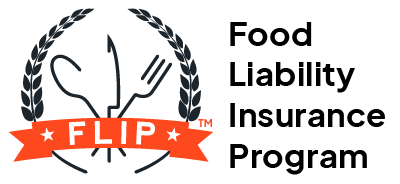Food Truck Insurance
Get affordable insurance for food trucks and enjoy peace of mind — wherever you park.
Benefits of Food Truck Insurance
Insuring your food truck business with Food Liability Insurance Program (FLIP) has its perks.

Affordable Policies
We keep the prices low with agents who don’t make commission and policies you can purchase 100% online.

Free and Unlimited Additional Insureds
Add festivals, venues, and commercial kitchen owners to your policy from your online account — free of charge.

Coverage That Goes With You
Your food truck isn’t limited to just one location, and neither is your insurance. Stay covered wherever your mobile food business takes you.
What Is Food Truck Insurance?
Food truck liability insurance is designed to protect your business from the most common types of claims food trucks face by combining general liability with product liability coverage. This includes:
The most common claims food truck operators file with us are slip-and-fall injuries, which cost $6,271 on average. FLIP’s policy is designed to cover claims like these so you aren’t left paying thousands of dollars out of pocket.
What Does Insurance for Food Trucks Cover?
Food truck insurance is designed to cover expenses you may be held liable for in the event of a claim, such as:
- Medical bills
- Repairs or replacements for damaged or destroyed property
- Attorney’s fees
- Settlements
Insurance provides a financial shield against these costs, saving you the burden of paying them out of pocket.
What Type of Insurance Does a Food Truck Need?
All food trucks need the following insurance coverages:
These coverages are included in FLIP’s base food truck insurance policy because they cover risks all food truck operators face while doing business.
However, many food truck businesses need additional coverages, including:
- Commercial Auto
- Cyber Liability
- Food Trailer Endorsement (Offered Exclusively by FLIP)
- Liquor Liability
- Professional Liability
- Tools & Equipment (Inland Marine)
- Workers Compensation
How Much Does Food Truck Insurance Cost?
A basic food truck policy from FLIP starts at $25.92 monthly or $299 annually. If you customize your policy with add-on coverages, the cost of your premium will go up. However, you will be better protected against the risks facing your business.
Learn more about the cost of food truck insurance and which factors affect how much you pay.
FLIP: The Best Food Truck Insurance Provider
Coverage Details:
General Liability
Aggregate Limit: $2,000,000
Food truck general liability insurance protects your business from the cost of third-party bodily injury and property claims. This includes someone slipping and falling in or around your food truck as well as accidental damages you cause to someone else’s property while conducting business there.
Product Liability
Aggregate Limit: $2,000,000
With food businesses, there is always a risk of food poisoning. Product liability insurance can protect you from the cost of someone suing you due to a foodborne illness or unlabeled allergen.
Products-Completed Operations
Aggregate Limit: $2,000,000
Essentially two coverages combined in one, products-completed operations is designed to cover claims stemming from the products you sell and the services you provide. It can help cover costs associated with food poisoning as well as a customer suing you because you showed up late to cater their event.
Personal and Advertising Injury
Aggregate Limit: $1,000,000
If your business gets hit with a claim related to how you advertise your goods or services, this coverage can pay for related legal expenses. This includes allegations of slander, defamation, and libel.
Damage to Premises Rented
Aggregate Limit: $300,000
This coverage can pay for the cost of property damage you cause to a rented space, such as a commercial kitchen or a spot at a festival. If you rent the space for seven days or less, it will cover any eligible claims associated with the property. However, if you rent for more than seven days, it will only cover damages caused by fire.
Coverage Details Limits
General Liability Aggregate Limit
$2,000,000
Products – Completed Operations Aggregate Limit
$2,000,000
Personal and Advertising Injury Limit
$1,000,000
General Each Occurrence Limit
$1,000,000
Damage to Premises Rented to You Limit (Any One Premises)
$300,000
Liability Deductible
NO DEDUCTIBLE
Inland Marine Limit (Any One Article / Aggregate)
$5,000/$10,000
Inland Marine Limit (Per Occurrence) – Deductible
$250
Medical Expense Limit
$5,000

Why Food Trucks Choose FLIP
Here's what other people say about their experience from over 300+ reviews.
Learn More About Food Truck Insurance
Discover what FLIP’s food truck insurance policy includes and how it can protect your business from common claims.
FAQs About Insurance for Food Trucks
Do I Need Insurance for My Food Truck?
Yes. You can be held liable if injuries, illnesses, or damages happen due to your food truck operations.
Does Commercial Food Truck Insurance Cover My Food Trailer?
Business insurance from FLIP can cover your food trailer if you add our exclusive food trailer endorsement to your policy.
This extends your general liability coverage to include incidents occurring in, on, or around your food trailer when it’s detached from your towing vehicle and parked at a food festival, farmers market, or other rented premises.
This endorsement is only available from FLIP and costs $12.50 per month.
What’s the Difference Between General Liability and Commercial Auto Insurance for a Food Truck?
General liability insurance covers third-party bodily injuries and property damage caused by your business operations. Commercial auto insurance covers bodily injury or property damage caused by your food truck, plus damages to the food truck itself.
Keep in mind, FLIP’s food truck policy is not a commercial auto policy. However, we do offer commercial auto liability coverage that you can bundle with your general liability policy!
Do I Need a Special Policy If I Operate in Multiple States or Travel to Different Events?
Nope! FLIP’s food truck policy covers your business wherever you go — including other states — provided you follow the laws and regulations for food truck businesses in that area.
